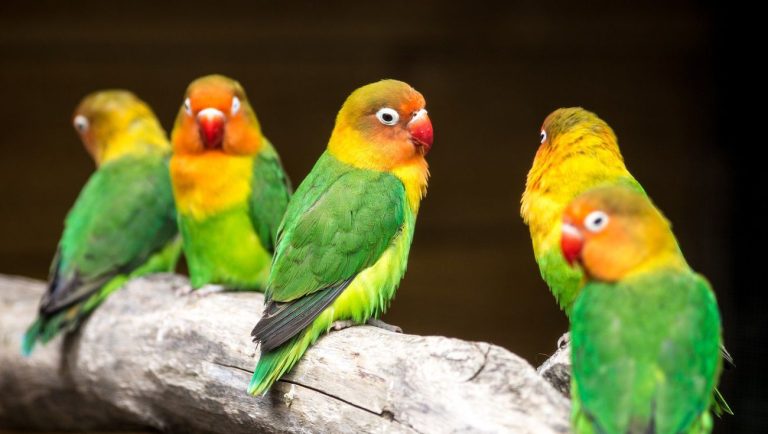The Rosy-faced Lovebird: A Complete Guide for Beginners and Experienced Bird Owners
The Rosy-faced Lovebird, also known as the peach-faced lovebird or Agapornis roseicollis, is a popular choice for bird enthusiasts of all experience levels. Its vibrant plumage, affectionate nature, and relatively easy breeding make it an ideal pet, particularly for those new to birdkeeping. This comprehensive guide delves into the characteristics, behavior, and breeding process of this captivating avian companion.
Understanding Rosy-faced Lovebird Characteristics: Personality and Temperament
The name “lovebird” is aptly chosen. These birds are known for their strong pair bonds and affectionate displays. However, their endearing nature doesn’t negate their unique personality traits. These birds are:
Highly Social: Rosy-faced Lovebirds thrive in pairs or small flocks. Solitary confinement can lead to stress and behavioral problems. Providing ample social interaction is crucial for their well-being.
Active and Playful: Their energy levels are high, demanding enrichment activities like foraging toys, climbing structures, and plenty of space to explore. A bored lovebird is a destructive lovebird!
Intelligent and Curious: These birds are capable of learning tricks and responding to training. Their inquisitive nature often leads them to explore their surroundings, so be prepared for some playful mischief.
Vocal: While not excessively loud, their calls can be quite sharp and frequent, especially during courtship or when expressing excitement or distress. Be realistic about their vocalizations before bringing one home.
Territorial: Although affectionate with their owners and partners, Rosy-faced Lovebirds exhibit territorial behavior towards other birds and may not tolerate sharing their space peacefully.
Rosy-faced Lovebird Habitat and Diet: Meeting Their Needs
In the wild, Rosy-faced Lovebirds inhabit arid and semi-arid regions of southern Africa, foraging for seeds, fruits, and berries. Replicating their natural environment as much as possible is essential for their health and happiness in captivity. This includes:
Diet: A high-quality seed mix formulated for small parrots should form the basis of their diet. Supplement this with fresh fruits, vegetables, and occasional treats like sprouts or cooked grains. Ensure access to clean, fresh water at all times.
Housing: A spacious cage is essential, allowing ample room for flight and play. Provide perches of varying diameters to encourage foot health and prevent foot problems. Consider a cage with multiple levels to promote climbing and exploration.
Enrichment: Stimulating their minds is key to preventing boredom and behavioral issues. Offer a variety of toys, rotate them regularly, and incorporate foraging challenges to keep them mentally engaged.
Breeding Rosy-faced Lovebirds: A Step-by-Step Guide
Rosy-faced Lovebirds are relatively easy to breed, making them suitable for beginners interested in avian reproduction. However, responsible breeding necessitates understanding the process and the bird’s needs.
Breeding Season: While they can breed year-round under optimal conditions, their natural breeding season aligns with warmer months.
Nest Box: Provide a suitable nest box – a dark, secluded space is crucial for successful breeding. Offer nesting materials like straw, shredded paper, or soft wood shavings.
Egg Laying and Incubation: The female typically lays 4-6 eggs, laying one every other day. Only the female incubates the eggs, for approximately 21-23 days.
Chick Development: The chicks hatch altricial (helpless), requiring constant parental care. They remain in the nest for approximately 30-35 days before fledging.
Nutritional Needs: Providing a balanced and nutritious diet is vital, particularly during breeding and chick-rearing. Mineral deficiencies can lead to feather plucking in parents, so ensure access to a mineral block or supplemental vitamins.
Addressing Common Concerns: Challenges and Solutions
While Rosy-faced Lovebirds are relatively easy to care for, certain challenges may arise:
Aggression: While generally friendly, they can exhibit aggression towards other birds or even their human companions, especially during breeding season or if feeling threatened.
Feather Plucking: This can stem from stress, boredom, nutritional deficiencies, or medical conditions.
Disease: Like all birds, they are susceptible to various diseases. Regular veterinary check-ups are recommended.
Noise: Their calls can be surprisingly loud at times.
Conclusion: Embracing the Rosy-faced Lovebird Experience
The Rosy-faced Lovebird offers a rewarding experience for bird enthusiasts of all levels. Their striking beauty, affectionate personalities, and relatively straightforward care make them excellent companions. However, responsible ownership requires understanding their specific needs, providing a stimulating environment, and addressing potential challenges proactively. By following this comprehensive guide and ensuring their well-being, you can enjoy years of companionship with these delightful avian friends.

